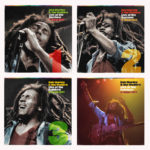In the fall of 2020, as part of the ongoing celebration recognizing Bob Marley’s 75th birthday, the Marley family, Island Records, and Universal Music released a full concert recording from June 4, 1977 at London’s Rainbow Theatre. Two years later, the nods honoring Marley continue; this time with the other three concerts from that London four-show run, in their entirety, released digitally. (Additionally, as part of the festivities, there is a consolidated reissue of the deluxe edition of Exodus for that monumental album’s 45th.)
The Rainbow shows, given their place in Marley history and their impressive sonic restoration, are deserving of the focus. Only a few excerpts from the multi-night stand had been released previously as part of an Exodus deluxe. Never having been officially available in these complete forms until now, it’s an incredibly valuable and entertaining haul.
Bob Marley and the Wailers as a concert experience always was a conscious-raising event. The June 1977 performances, the final ones for the year, carried extra weight and incentive following an attempt on the artist’s life at his home in Jamaica, and his subsequent self-imposed exile in England. Marley was standing at a spiritual precipice, choosing to return to the stage and inspired to take his audiences with him: politically; socially; emotionally.
The trio of appearances are phenomenal in their execution, including of the then-freshly created material amongst an otherwise solidified repertoire. The Wailers are drill-team sharp; Junior Marvin carving and caressing on guitar; Tyrone Downie, a skilled and versatile marksman on keyboards. The Barrett brothers- “Family Man” on bass; Carlton on drums- forming a locked-down machine of rhythmic bliss, holding the most patient and precise pace, accented wonderfully by percussionist “Seeco” Patterson; the I-Three’s sparkling in vocal symbiosis with the Skipper.
As for Marley, in spite of or because of the recent events, he is impenetrable; a leader and a provocateur of the highest order; finding an escape portal in the music as he deploys it, spreading the word. Each of the three performances has subtle differences in content, character, and delivery that are worth exploring closely; slightly shifting inflections; in-the-moment improvisations.
What remains consistent, though, is a palpable, hypnotic cycle of intent; one that draws in and holds for the duration, as each song easily eclipses the time, and often eases the tempo, of its studio counterpart, to enthralling effect. Feel the soul-wrenching performances of “No Woman, No Cry.” Witness the dynamic dissolution into silence on “Crazy Baldhead”- and the conspicuous pause between its conclusion and the audience response- for irrefutable proof of the trance; just a few of the myriad highlights.
The movement of Jah people, setting the captives free. Mesmerizing.



No Comments comments associated with this post